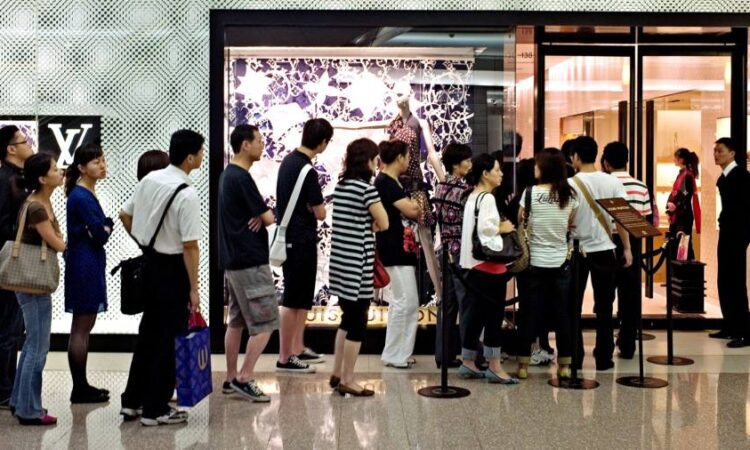
Search online for the Bulgari Serpenti watch. Gold, steel and diamond in construction, one model coils around the wrist three times, in case someone misses it on first or second glance. Or consider the Gucci Marmont Matelassé shoulder bag. It has two big “G”s on it in gold and — that being insufficient gold — a gold chain. A third item for our delectation might be a Givenchy T-shirt. You can tell it is Givenchy because it says “GIVENCHY”.
I am no arbiter of taste, so it is with some hesitation that I make the following argument.
This stuff is tat, isn’t it? It is a naïf’s idea of glamour. Like paying for a Twitter blue tick, wearing it conveys the opposite of status: neediness, impressionability.
There are lots of bad arguments against the booming European (in truth, Franco-Italian) luxury goods sector. No, it isn’t immoral. LVMH employs people and pays taxes. Nor does it matter that US tech is more “serious”. All economies have their specialisms, their comparative advantages. Is Europe meant to neglect its own until it builds a Silicon Riviera or whatever?
All these complaints avoid the central issue: the intrinsic ghastliness of the products. And the ease with which Europe can foist them on extra-European markets. I don’t suggest that LVMH boss Bernard Arnault laughs at America and Asia behind his hands. But he must know that he can put out almost any trinket and find a paying audience. In his place, I would be drawling ideas into a Dictaphone at 3am, just to see what can be got away with. “Gilt phone charger . . . ivory kennel . . .”
The luxe boom tells you more about world politics than another Henry Kissinger interview will. Such as? The “global south”, wherever that is, has a more complex attitude to its old oppressors than it often pretends. Yes, there is suspicion, much of it warranted. There is superiority, much of it earned. (How could a Singaporean not find western Europe static?)
But there is also the opposite: an undue but ingrained deference to Europe on certain questions of taste. VS Naipaul wrote about the postcolonial urge to “mimic” the metropole. This once meant Anglicising things: accents, manners, names. A childhood memory of mine from Nigeria is “Oxford bread”, which I am sure was just bread.
As poor countries sprouted a commercial overclass, their mimicry took the form of consuming the “best” Old World brands. But it comes down to the same thing: self-doubt, at the national and cultural level. The luxury trade isn’t evil. But it is sad. There is something pathetic, in the original sense of the word, about a certain kind of global luxe living: marble floors, white furniture, champagne flutes, too-strong fragrances, restaurants with handbag stools. It is not the visual naffness. It is the imitation of an aesthetic that is held in ironic disdain in its home market.
Let me anticipate a luxury-sector rebuttal. “Our items hold their value.” Perhaps they do. But how many of the customers resell them? Or borrow against them? Another line of defence is that of innate build quality. Please. The business model is genius precisely because the unit cost of production, next to the retail price, is so low.
No, be honest, let go of embarrassment, and admit that Europe is playing a very remunerative joke on the world. More power to it. Here is the other geopolitical lesson of the luxe boom. Don’t write off the old continent. Tourism, luxury, football: nowhere enchants foreigners so profitably. The idea that Europe is a pleasure palace, not a wealth-making machine, assumes it can’t turn the one into the other on a lasting basis.
“Do you know anyone who buys this stuff?” asked a (British) friend last month, when the luxe trade was in the news. I used to.
Soho. 1996. Fake, stolen or imperceptibly damaged luxury goods are being sold from a crate. Your columnist and his associates have to buy fast or what these vendors call the “feds” will turn up. We “score” a Dior watch, Versace jeans and a belt from Moschino (which we pronounce Mosh-een-o). Over time, the dream comes true: no item on our persons is without a famous logo.
I desired these marques because I was 14 and a considerable idiot. To think I also saw where the world was going.
Email Janan at [email protected]





